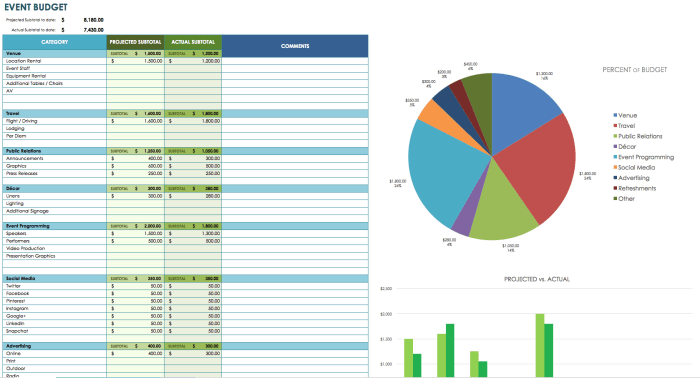Developing a Marketing Budget is key to unlocking business success. Dive into the world of budgeting with an American high school hip twist that will keep you hooked from the get-go.
Explore the ins and outs of budget allocation, market research, and the tools needed to master the art of marketing budgets.
Importance of Developing a Marketing Budget

Having a well-thought-out marketing budget is crucial for businesses as it helps allocate resources effectively, measure ROI, and maximize the impact of marketing efforts.
Impact on Marketing Campaigns
A marketing budget can greatly impact the success of marketing campaigns by determining the reach, frequency, and quality of marketing activities. For example, a higher budget allows for more extensive advertising placements, influencer collaborations, and promotional events, leading to increased brand visibility and customer engagement.
Relationship with Business Goals
The relationship between a marketing budget and achieving business goals is intertwined, as the budget sets the foundation for implementing strategies that align with the company’s objectives. By investing in marketing initiatives that support business goals, such as increasing sales, expanding market share, or launching new products, a well-planned budget can drive growth and profitability.
Factors to Consider When Developing a Marketing Budget
When creating a marketing budget, businesses need to take into account several important factors to ensure the effectiveness of their marketing strategies and campaigns.
Market Research
Market research plays a crucial role in determining marketing budget allocations. By conducting thorough research, businesses can gain valuable insights into their target audience, competitors, and industry trends. This information helps in making informed decisions on where to allocate marketing funds for maximum impact.
Setting Realistic Budgeting Goals and Objectives
One of the key factors to consider when developing a marketing budget is setting realistic goals and objectives. It is essential to establish clear and achievable targets that align with the overall business objectives. By setting realistic budgeting goals, businesses can ensure that their resources are allocated effectively and that their marketing efforts are focused on driving tangible results.
Strategies for Allocating Budget Across Different Marketing Channels
In today’s digital age, marketers have a plethora of channels to choose from when allocating their budget. It is crucial to understand the strengths and weaknesses of each channel to make informed decisions on where to invest your marketing dollars.
Digital Marketing
When allocating budget for digital marketing, consider the reach and targeting capabilities of platforms like Google Ads, social media ads, and email marketing. These channels allow for precise audience targeting and real-time tracking of campaign performance.
Traditional Marketing
Traditional marketing channels such as print ads, radio, and television still play a role in reaching certain demographics. While these channels may have a broader reach, they often lack the targeting capabilities of digital channels.
Social Media Marketing
Social media platforms like Facebook, Instagram, and Twitter offer unique opportunities to engage with your audience in a more personal way. Budget allocation for social media should consider the platform where your target audience is most active.
Importance of Diversifying Budget Allocation
Diversifying your budget across different marketing channels helps mitigate risks associated with relying too heavily on one platform. By spreading your budget, you can reach a wider audience and test different strategies to see what works best for your brand.
Tips for Prioritizing Budget Allocation
- Identify your target audience: Understand where your audience spends their time online and allocate budget accordingly.
- Set campaign objectives: Determine the goals of your marketing campaign and allocate budget to channels that align with those objectives.
- Monitor and adjust: Continuously monitor the performance of your campaigns and adjust budget allocation based on what is working best.
Tools and Resources for Managing a Marketing Budget: Developing A Marketing Budget

In today’s digital age, there are numerous tools and software available to help businesses effectively manage and track their marketing budgets. These resources not only make the budgeting process easier but also provide valuable insights into the performance of marketing campaigns.
1. Marketing Budgeting Software
- Tools like QuickBooks, FreshBooks, and Mint are popular choices for budgeting and financial management.
- These software solutions offer features such as expense tracking, budget forecasting, and customizable reporting.
- Businesses can use these tools to set budget goals, track expenses in real-time, and analyze spending patterns.
2. Project Management Platforms
- Platforms like Asana, Trello, and Monday.com can help businesses streamline their marketing budgeting processes.
- These tools allow teams to collaborate on budget planning, allocate resources efficiently, and track project timelines.
- Integrating project management platforms with budgeting software can improve overall budget management and project execution.
3. Analytics Tools, Developing a Marketing Budget
- Tools like Google Analytics, HubSpot, and Adobe Analytics provide valuable insights into campaign performance and ROI.
- Businesses can leverage these tools to monitor key metrics, track conversions, and assess the effectiveness of marketing strategies.
- Using analytics data, businesses can make informed decisions about budget allocation, optimize campaigns, and maximize ROI.




